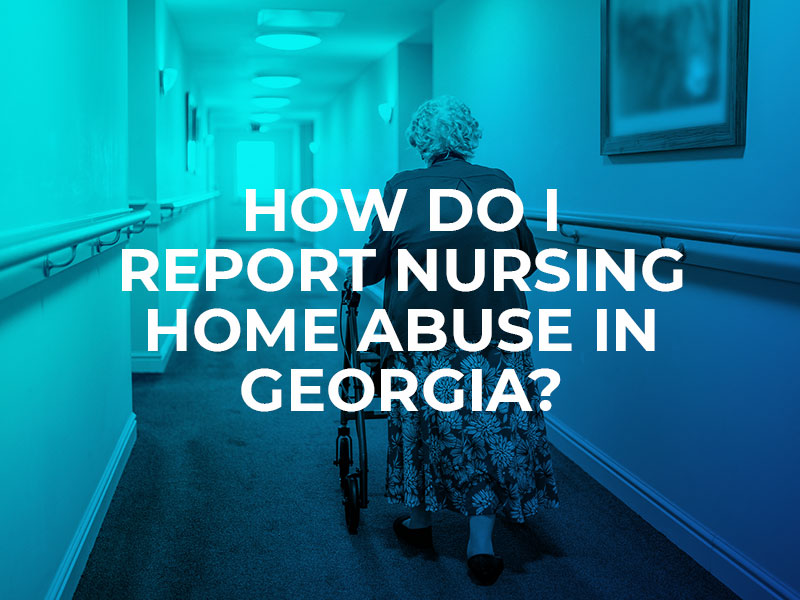How Do I Report Nursing Home Abuse in Georgia?
Nobody should ever have to worry about their loved ones being abused or neglected in a Georgia nursing home. Unfortunately, nursing home abuse and neglect are a problem in this state. It is important that you know how to recognize the signs and symptoms of nursing home abuse as well as how to report it to authorities.

How do I report suspected abuse or neglect?
If you suspect that your loved one has been abused or neglected in a nursing home, call the Georgia Department of Community Heath’s Healthcare Facility Regulation (HFR) division at 800-878-6442.
On their website, you can also find instructions about how to file an official complaint. The complaint page will ask for your information, the information of the victim of the suspected abuse, information about the facility you are filing the complaint about, as well as detailed information about the complaint.
The HFR “is responsible for health care planning, licensing, certification and oversight of various healthcare facilities and services in Georgia.” This agency is supposed to investigate all complaints and make quick decisions regarding the health of facility residents.
What is nursing home abuse and neglect?
There are various types of abuse that take place in nursing homes. Elder abuse happens in both physical and non-physical forms and is not always easy to detect. Abuse can include:
- Physical Abuse: this happens in various ways and can including pushing, burning, slapping, punching, shoving, or other actions to cause pain to a nursing home resident.
- Sexual Abuse: this is another form of physical abuse. Though this seems unthinkable to many, it does happen and includes any sexual contact between a nursing home resident with staff or volunteers of the facility.
- Emotional or Psychological Abuse: though this is not physical abuse, it can be detrimental to an elderly nursing home resident. This abuse can be both verbal and non-verbal, and it means to inflict mental distress or fear. It can take the form of name-calling, property destruction, intimidation, and isolation.
- Financial abuse: in many cases, nursing homes and staff members have access to a resident’s personal and financial information. This can lead to inappropriate spending, theft, or even identity theft.
- Neglect: nursing homes and staff have a duty to ensure residents’ basic needs are met each day. This includes providing food, water, hygiene, clothing, and medical care.
- Failure to Call Emergency Services: failing to call emergency services when a serious situation arises is a form of abuse.
- Poor Supervision: many residents in nursing homes need extra supervision for their own protections. This includes those at heightened risk of falls, those with dementia at-risk of wandering away, and more.
What at the signs of abuse to look out for?
Friends and family members of those in a nursing home should always be on the lookout for signs that abuse or neglect is taking place. Signs of physical abuse can include:
- Unexplained bruises, welts, cuts, scrapes, or other marks
- Black eyes
- Broken bones
- Open wounds, including bedsores
- Signs of drugging or medication overdoses
- Marks consistent with restraints
- Marks around the genital or breast area
- Unexplained infections (including sexually transmitted infections)
You should also look out for behavioral signs of abuse. This can include sudden changes in personality, depression, and anxiety. Signs of neglect often include things like dirty clothing or bed linens, dirty rooms, dehydration, sudden weight loss, and more.